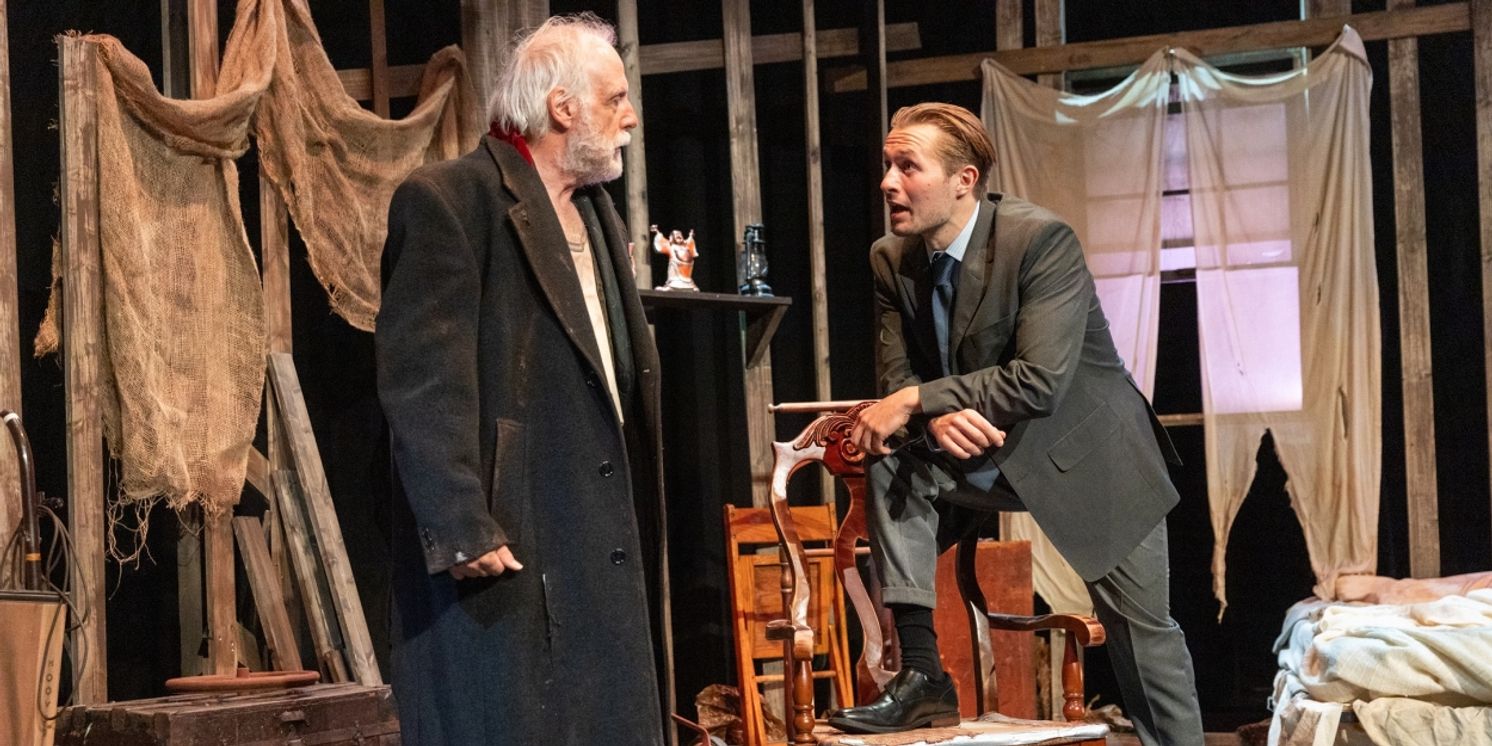Review: THE CARETAKER at Edge Of The Universe Theater
Pinter's absurdist play, well-done at The Writer's Center

The Writer’s Center is just the right place to stage a reverent version of one of Harold Pinter’s best known plays.
Pinter’s modernist, somewhat absurdist “The Caretaker,” which the Edge of the Universe Theater is presenting at Bethesda’s Writer’s Center in a fine production, fits nicely alongside groundbreaking mid-20th century work from writers ranging from his friend Samuel Beckett, to Jean Genet or Eugene Ionesco.
It involves one man taking in a down-on-his luck character after being fired from a cafe. As the newcomer makes himself at home in a strange, attic-like flat strewn with trash, old boards and appliances in need of repair, he meets the man’s brother, who brings with him his own sense of mystery.
Who exactly is the landlord? Who is squatting? Whose offer of being caretaker of this property is actually real? Whose foggy dream of vague achievement is likely to have a fighting chance? That’s something for the visitor and the audience to figure out through a largely enjoyable evening of riddles and roundabout dialogue.
Director Stephen Jarrett keeps it all percolating with a strong cast that’s directly plugged into Pinter’s particular rhythms, repetitions and quirks.
At the outset, most of this dialogue is from David Bryan Jackson as the tatty guest. Wild-haired with a beard, and in a long, tattered overcoat (costumes by Lauren K. Lamble), he brings the accent and sharp comic rhythms worthy of a Monty Python cast member, talking too much about the behavior that got him fired from his latest job, how he’s been mistreated or underestimated, or his intent to walk to some far-off suburb to get papers that would help straighten out his situation.
He’s glad to get the charity of this unknown, oddly well dressed man that took him in, but a little curious about it too.
Mark Krawczyk, as the host, plays his cards close to his vest, as he fiddles with repair of a wire and plug, but is happy to share a spare bed (after its accumulated trash is cleared off) or offer a new pair of shoes to his needy but somewhat particular guest (the shoes are too pointy for one thing; a replacement pair has the wrong color of laces).
Eventually, we learn of his ambition to build a shed outdoors, and later still, about a chilling episode in mental illness at the time that might have ended him up in this less-than-optimum space.
His slicker brother (Max Johnson) may seem to be better off, in his leather jacket and shiny boots, but certainly has his own air of mystery as well as ambition — he imagines specific lavish home improvements and maybe a string of real estate holdings.
All three have accents that aren’t quite similar, but may be perfectly accurate in a London bringing people from other neighborhoods or even countries.
Sarah Reed’s set design is a key part of the milieu — its well-appointed squalor, off kilter boards, precise pieces of antiques and street throwaways building this crumbling work in progress. Lighting director Christina Giles is dependent on a line bare bulb that seems to waver in intensity and makes it very dark between acts.
Jackson, who was also in charge of sound design and composed some of its piano music, had a lot on his plate but could have added the touch of an actual front door slam rather than a recording to keep up the realism (ditto the occasional drops in a precarious overhead bucket that sounded like thuds from its recording in the back of the house).
Modern nomenclature prevents the production from calling Jackson’s temporarily unhoused character a “tramp.” Likewise there are all manner of warnings from the theater about “racial epithets” used in the text, as the guest rails against immigrants he imagines are behind his bad luck (“Racist remarks made by one character do not reflect the beliefs of either the playwright or the theatre company, but do help to reveal the psychology of the character,” its website advises, bold-facing the “do not”).
Nevertheless, “The Caretaker” stands like the classic it is in this reverent, well-done production by a company serious about doing artful work, in a building meant to elevate the writer.
Running time: About two hours with one intermission.
Photo credit: David Bryan Jackson and Max Johnson in “The Caretaker.” Photo by DJ Corey Photography.
“The Caretaker” runs through Oct. 22 at The Writer’s Center, 4508 Walsh St., Bethesda, MD. Tickets available online.
Reader Reviews

Videos

